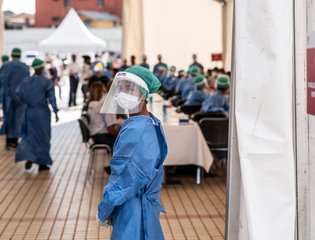Alongside the ALNAP Lessons Papers on Flood Relief and Urban Disasters we would like to offer a pithy summary of the essential golden rules of recovery management. We hope they will be of use to operational staff and policy makers alike.
Rule #1: Trust survivors and avoid paternalism
The recovery process is totally demanding and all resources, international, national and local, need to be mobilised for the task. Relief and recovery agents must at all costs avoid paternalism: treating passive 'victims' rather than enabling active 'survivors'.
There is a principle here to respect - these 'survivors' are the primary actors in their recovery, and while assisting groups can play vital roles, they must avoid creating dependency. Thus, they must not undertake any task that duplicates what the survivors can undertake themselves. Their active role to recovery actions is a vital part of their own psycho-social recovery.
The recovery process needs to be 'demand-driven' from the surviving community, rather than 'supply-driven', where agency and commercial self-interests dominate.
Rule #2: Trust survivors and enable survivors to assess their own needs
Where possible encourage communities and individuals to assess their own needs, thus avoiding multiple needs assessments by external agencies.
Rule #3: Trust survivors and provide cash rather than kind
Provide cash grants and trust affected families to determine whether they need shelter materials, blankets, boats, etc. If families are not yet in a banking system help them to get into personal banking, and distribute their aid directly through this manner, thus avoiding middlemen, where corruption often starts.
Rule #4: Think locally
Localise all interventions; infusing cash into local markets and using locally available materials and resources. Through this approach it is possible to rebuild livelihoods, and support the devastated local economy. People with work can help finance their own recovery.
Support local agencies and suppliers; as opposed to the normal trend of allocating contracts to external groups competing and taking over.
Support the recovery of local governments, who need to play vital roles in local recovery coordination. International NGO’s must avoid hiring local officials, at inflated salaries, away from their government roles - an approach that seriously weakens local governments.
Rule # 5: Give priority attention to vulnerable groups
Pay attention to special vulnerable groups (such as minorities, the sick, people with special needs, elderly, etc.) and communities within remote areas.
Rule #6: Think 'process' not product, ‘sheltering’ not shelters, ‘housing’ not houses
Regard sheltering as a dynamic process, rather than just a collection of tangible products. Therefore, for example, encourage sheltering of displaced families with host families, and provide support to those who have opened their houses to survivors.
Avoid a three-stage sheltering process, from emergency shelters or tents, to transition housing, to permanent reconstruction. Seek to extend the first stage and accelerate permanent safe dwelling reconstruction thus avoiding the waste of building transition housing, that can delay reconstruction.
Rule #7: Adopt a long-term perspective while addressing short-term needs
Start focussing on recovery from the initial stages; identifying proposed exit strategies and follow-up measures.
Prepare from now for the next big disaster; building resilience to save lives and livelihoods.
